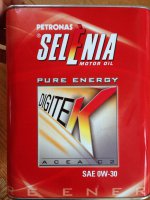Having had many FIATs and Alfas in the dark , distant past , then moving onto the Japanese for the reliability thing ( sorry ! ) I've now got a new Panda TwinAir Easy to join the family fleet - 2 Japs , 1 German and the Italian .
Anyway , all those years ago , with the old Alfas and FIATs there was forever the problem of them changing the spec or supplier of parts etc . Which , of course , created absolute mayhem when trying to source replacement bits . And the dealers never had a clue about any of this , " No mate , got to be the right bit . Must be you . Sorry , not taking it back . "
Well , the new FIAT needs some oil ( 5,000 miles ) to top-up to the max mark . Handbook specifies quite clearly 0W30 grade . Every local dealer I've spoken to , however , states it's 5W40 they put in . " Don't bother with the 0W30 , " they say . " We never put that in . The handbook must be wrong . Costs us too much anyway . You want the 5W40 . " Nor do they even stock the stuff .
So , once again , FIAT dealers haven't a clue . No wonder they remain hopeless in all the customer surveys . Anyway , could the fact that dealers are putting 5W40 into TwinAir engines rather than the correct specification ( possibly for the more recent engines ? ) 0W30 be the reason behind the spate of engine problems/failures and turbo issues ?
With the factory fitted oil I've been getting terrific mpg - upper 50's + . Even been in the mid 40's when driven with gusto . I suspect I'd lose this with the older , lower spec oil . To say nothing about the hidden damage going on !
Our Subaru Forester also gives great economy even though it's 4x4 and an auto . 0W20 is the grade recommended , though others can be used too .
So , I'm going to persevere for the TwinAir Panda and ignore the dealers and go for 0W30 . I'd be interested in your comments .
Well I've been through this many times on the forum, Liam is right - it's a mess. I was in exactly the same dilemma with my 500 TA, manual saying 0w and fiat telling me 5w. Anyway I had the 1st service done at 10k and my fiat approved indie put in 5w as recommended by fiat, I too thought this was a safe bet. The car ran like a dog so we decided to go with 0w, they dident have any selenia digitek in stock so as a temporary measure they put in Castrol Edge 0w but c3 not c2 as it should be - the car ran much better. Indie then ordered up the correct selenia oil and put it in, I asked him to keep me the can, it turned out fiat sent them the wrong grade, it was 0w30 c2 alright but designed for diesels, WR Forward I think it was called, having said that the car ran much better on it and sounded quieter too. Eventually the correct Digitek arrived and they did yet another oil change and that's what's in the car now, 900 miles later no problems! My only doubt is to what the original 5w oil was that they put in? Did it run badly cos it was 5w or cos it was actually the wrong 5w, they said it came out of a drum so I'm not convinced it was right. Anyway my advice 5 oils later is to go with the manual and put in Selenia Digitek 0W30 C2 grade, my car likes it anyway and is running great!


